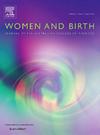应对策略和干预措施,以防止和减轻助产士工作倦怠:定量和定性研究的快速范围审查
IF 4.1
2区 医学
Q1 NURSING
引用次数: 0
摘要
医疗保健行业的工作倦怠是一场公共卫生危机。由于工作量大、人员短缺以及为分娩妇女提供护理的情感需求,这种情况在助产士中尤为普遍。职业倦怠影响助产士的健康和提供高质量护理的能力,加剧了劳动力的挑战。在文献中描述了应对策略和干预措施,以预防和减轻助产士的工作倦怠。目的确定和描述有关应对策略和干预措施的证据,以预防和减轻助产士的工作倦怠。方法系统检索4个电子数据库,进行快速范围综述。三名审稿人筛选并提取了报告的应对策略和干预措施的数据,并将其整理并以叙述形式呈现。共发现7379篇文献,纳入21篇文献。在纳入的研究中,有五种主要的应对策略可以预防和缓解助产士的职业倦怠:同事的支持和理解;来自工作场所的结构化支持;来自朋友和家人的支持;从事件中反思和学习的能力;意识到在实践和事件后使用的自我护理技巧。讨论和结论:产科服务必须优先考虑员工的福祉,增加对预防和减轻职业倦怠的关注,以支持助产士的保留,并确保对妇女的安全、有效护理。未来的研究可以集中在探索如何有效地实施对助产士的实际支持,如监督和汇报,并确定现实的、可持续的方法,将心理知情方法整合到助产实践中。本文章由计算机程序翻译,如有差异,请以英文原文为准。
Coping strategies and interventions to prevent and alleviate work-related burnout in midwives: A rapid scoping review of quantitative and qualitative research
Problem
Work-related burnout in healthcare is a public health crisis. It is particularly prevalent in midwives, due to high workloads, staff shortages, and the emotional demands of providing care for birthing women. Burnout affects midwives’ wellbeing and ability to provide high-quality care, exacerbating workforce challenges.
Background
Coping strategies and interventions to prevent and alleviate work-related burnout in midwives have been described in the literature.
Aim
Identify and describe the evidence on coping strategies and interventions to prevent and alleviate work-related burnout in midwives.
Methods
A rapid scoping review was conducted with systematic searches in four electronic databases. Three reviewers screened and extracted the data on reported coping strategies and interventions, which were collated and presented in a narrative format.
Findings
7379 articles were identified, and twenty-one articles were included. Five overarching types of coping strategies to prevent and alleviate burnout in midwives were present in the included studies: Support and understanding from colleagues; Structured support from the workplace; Support from friends and family; Ability to reflect and learn professionally and personally from events; Awareness of self-care techniques for use in practice and after events.
Discussion and conclusion
Maternity services must prioritise workforce wellbeing by increasing the focus on preventing and alleviating burnout to support the retention of midwives and ensure the safe, effective care of women. Future research could focus on exploring how practical support for midwives, such as supervision and debriefing could be implemented effectively, and identify realistic, sustainable ways to integrate psychology-informed approaches into midwifery practice.
求助全文
通过发布文献求助,成功后即可免费获取论文全文。
去求助
来源期刊

Women and Birth
NURSING-OBSTETRICS & GYNECOLOGY
CiteScore
7.20
自引率
13.20%
发文量
371
审稿时长
27 days
期刊介绍:
Women and Birth is the official journal of the Australian College of Midwives (ACM). It is a midwifery journal that publishes on all matters that affect women and birth, from pre-conceptual counselling, through pregnancy, birth, and the first six weeks postnatal. All papers accepted will draw from and contribute to the relevant contemporary research, policy and/or theoretical literature. We seek research papers, quality assurances papers (with ethical approval) discussion papers, clinical practice papers, case studies and original literature reviews.
Our women-centred focus is inclusive of the family, fetus and newborn, both well and sick, and covers both healthy and complex pregnancies and births. The journal seeks papers that take a woman-centred focus on maternity services, epidemiology, primary health care, reproductive psycho/physiology, midwifery practice, theory, research, education, management and leadership. We also seek relevant papers on maternal mental health and neonatal well-being, natural and complementary therapies, local, national and international policy, management, politics, economics and societal and cultural issues as they affect childbearing women and their families. Topics may include, where appropriate, neonatal care, child and family health, women’s health, related to pregnancy, birth and the postpartum, including lactation. Interprofessional papers relevant to midwifery are welcome. Articles are double blind peer-reviewed, primarily by experts in the field of the submitted work.
 求助内容:
求助内容: 应助结果提醒方式:
应助结果提醒方式:


